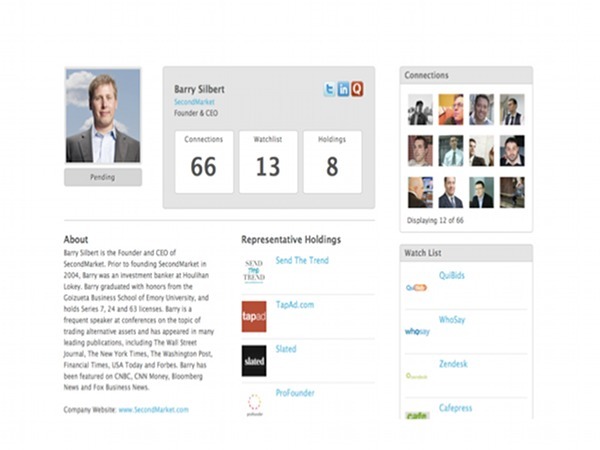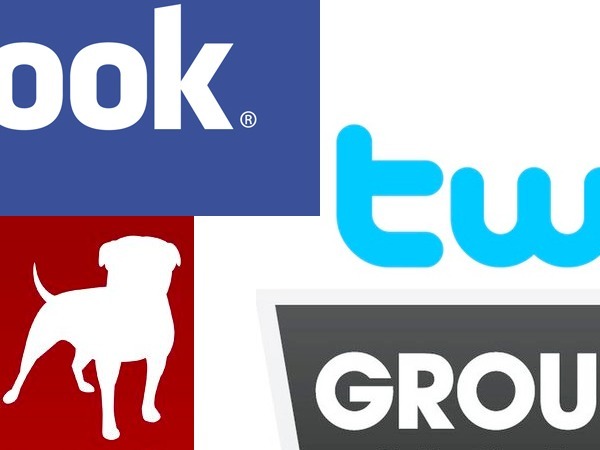
It’s no secret that large private companies, especially Facebook, have found an efficient path toward liquidity, thanks to secondary markets. In time, the option to buy and sell shares in just about any private company will become the norm.
SecondMarket, a leading platform to buy and sell private company shares and other illiquid assets, is set to unveil Friday its new look and social marketplace, designed to broaden the world of secondary market trading to any private company and the world’s investors. “We’re expanding the universe of companies that are discoverable to over 12,000,” said Barry Silbert, founder and CEO of SecondMarket, in an interview. Currently, there are 50,000 members on SecondMarket, the vast majority of whom are buyers of stock.
Heretofore, SecondMarket had listed 500 companies, with the bulk of trading and interest coming from the likes of Facebook, Zynga, Groupon, to name a few. Indeed, 40% of last year’s $400 million in private company trading came from trading in Facebook shares alone. With Facebook potentially hitting the public markets in 2012, SecondMarket is hoping to tee up a whole new crop of trading opportunities.
“What’s interesting is that over the past 18 months, we’ve received inquiries from sellers in 1000 companies,” Barry added. To this end, SecondMarket has developed a platform to allow demand to be created for those companies. “The idea is crowd-source which companies people want to buy and sell stock in… We’re now giving the crowd the opportunity to identify the companies to invest in.”
In order to aggregate demand and enable the crowd to identify which companies they’re interested in, SecondMarket has tapped into the social sphere by creating a platform upon which members can create a profile for themselves, a watch list of companies, as well as a trusted network of colleagues to learn from and share activity in companies. “If you look at the way people invest in companies, it’s social,” Barry explained. “We’re helping faciltate offline relationships online.”
SecondMarket plans to capture information about the most-watched companies and aggregate the price at which buyers are willing to pay. If they have enough demand, they will aproach a company and suggest that they create a market for their stock. “There wont’ be a need to create a market unless there’s sufficient demand,” said Barry.
The UI (user interface) is pretty sweet and simple. I was one of the 100 beta testers who got to check it out. Once registered, you’re automatically following SecondMaket, but you can choose from the thousands of companies listed.

For now, the information aggregated is mainly news. So initially, it’s akin to a personalized news feed for companies. But over time, other information more pertinent to trading, such as filings, or special reports, could be aggregated and part of the feed.

A person can also create a network of trusted investors to share investment ideas and learn from. Your trusted network can see your holdings and see which companies are in your watch list.

So, who will be trading on this platform? For now, institutional traders make up 85% of the investment activity, said Barry. Given that the requirements to trade are high – you must be a sophisticated and accredited investor to buy shares – it’s not a surprise if institutions continue to make up the bulk of activity.
The question is whether there will be a greater need for information. And, if regulators will demand it. Already, they’re starting to investigate secondary-market transactions. The way Barry sees it, there will likely be a need, but it will be up to the companies. In fact, companies can choose how they want to participate in the marketplace. Companies can choose to be 1) Inactive 2) Open 3) Managed market. If a company chooses to be in an open market, then they’re just saying they’re open to trading activity. They can provide any information they’d like. The managed market option is where the company decides who gets to buy and sell shares.
While there’s no company like Facebook out there, demand for other private company shares will doubtless rise. After all, back in 2008, the entire $25 million in private company stock traded on SecondMarket was Facebook. Last year, 30 companies were traded on the platform.
But with more companies trading on SecondMarket, I’m sure it’s only a matter of time that more information will have to exist for investors. Accredited or not, they still can’t make a sound decision without it.



















